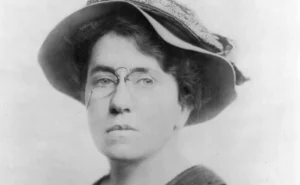
In honor of Jewish American Heritage Month, we continue to recognize the economic, cultural, political, and social contributions of notable immigrants and refugees who’ve helped shape America’s vibrant tapestry. Today, we highlight Russian American writer and activist Emma Goldman, a pioneering voice for women’s rights in the United States.
Emma Goldman was born in June 1869 in Kovno, in the Russian Empire (now Kaunas, Lithuania), to a Jewish family. From a young age, Goldman displayed a distaste for abusive and corrupt authority, while she often endured punishment throughout her school years. In 1985, Goldman immigrated to the United States, settling in Rochester, New York, where she worked in a clothing factory and was exposed to the harsh realities of industrial labor, further shaping her growing political frustrations.
Emma Goldman married Jacob Kershner in February 1887, obtaining U.S. citizenship through the marriage. Her citizenship remained tied to his until 1908, when the government revoked Kershner’s naturalization, resulting in Goldman losing her citizenship.
Following the Haymarket Affair in 1886 and other pro-labor demonstrations, Goldman moved to New York City, where she quickly emerged as a powerful public speaker and organizer. Her speeches included the advocation for workers’ rights, women’s emancipation, birth control, and freedom of expression.
Goldman’s influence on women’s rights was revolutionary for her time. She was a fierce advocate for women’s autonomy, particularly around issues like birth control and the right to an abortion, when such conversations were largely taboo. She paved her path, opening doors for women to challenge the traditional roles society imposed on them. During World War I, Goldman opposed the draft and the war effort, leading to her arrest under the Espionage Act.
In 1919, she was sentenced to two years in prison and a $10,000 fine. The U.S. Department of Justice’s General Intelligence Division named Goldman as “beyond doubt” one of the most dangerous anarchists in this country, deporting her to the Soviet Union under the 1918 Alien Act, regardless of her American citizenship.
Though barred from returning to the U.S. for many years, Goldman continued to write and speak throughout Europe and Canada. Her autobiography, Living My Life, remains a key influence in political literature, offering insight into the struggles of early 20th-century activism.
Emma Goldman died in 1940 in Toronto, Canada. Her place in American history was posthumously underscored in 1990 when the U.S. government acknowledged her lasting influence by including her among the 20th century’s most important American women in a National Women’s History Project.
Others we are celebrating in honor of Jewish American Heritage Month:
2025
Ralph Henry Baer, German American inventor and engineer
Emile Berliner, German American inventor and innovator
Irving Berlin, prolific Russian American composer
Emile Berliner, Austrian American actor
